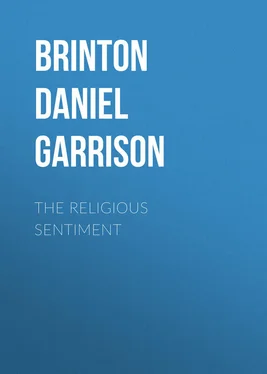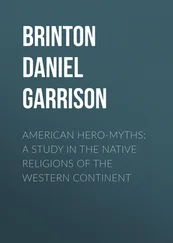Daniel Brinton - The Religious Sentiment
Здесь есть возможность читать онлайн «Daniel Brinton - The Religious Sentiment» — ознакомительный отрывок электронной книги совершенно бесплатно, а после прочтения отрывка купить полную версию. В некоторых случаях можно слушать аудио, скачать через торрент в формате fb2 и присутствует краткое содержание. ISBN: , Жанр: foreign_antique, foreign_prose, на английском языке. Описание произведения, (предисловие) а так же отзывы посетителей доступны на портале библиотеки ЛибКат.
- Название:The Religious Sentiment
- Автор:
- Жанр:
- Год:неизвестен
- ISBN:http://www.gutenberg.org/ebooks/30061
- Рейтинг книги:3 / 5. Голосов: 1
-
Избранное:Добавить в избранное
- Отзывы:
-
Ваша оценка:
- 60
- 1
- 2
- 3
- 4
- 5
The Religious Sentiment: краткое содержание, описание и аннотация
Предлагаем к чтению аннотацию, описание, краткое содержание или предисловие (зависит от того, что написал сам автор книги «The Religious Sentiment»). Если вы не нашли необходимую информацию о книге — напишите в комментариях, мы постараемся отыскать её.
The Religious Sentiment — читать онлайн ознакомительный отрывок
Ниже представлен текст книги, разбитый по страницам. Система сохранения места последней прочитанной страницы, позволяет с удобством читать онлайн бесплатно книгу «The Religious Sentiment», без необходимости каждый раз заново искать на чём Вы остановились. Поставьте закладку, и сможете в любой момент перейти на страницу, на которой закончили чтение.
Интервал:
Закладка:
Some have urged that such a method should not be summoned to questions in mental philosophy. To do so, say they, is to confound things distinct, requiring distinct plans of study. Such a criticism might have had weight in the days when the mind was supposed to inhabit the body as a tenant a house, and have no relation to it other than that of a casual occupant. But that opinion is antiquated. More than three-fourths of a century ago the far-seeing thinker, Wilhelm von Humboldt, laid down the maxim that the phenomena of mind and matter obey laws identical in kind; 1 1 In his essay entitled, Ueber den Geschlechtsunterschied und dessen Einfluss auf die organische Natur , first published in 1795.
and a recent historian of science sums up the result of the latest research in these words:
“The old dualism of mind and body, which for centuries struggled in vain for reconciliation, finds it now, not indeed in the unity of substance, but in the unity of laws.” 2 2 “Der alte Dualismus von Geist und Körper, der Jahrhunderte hindurch nach Versöhnung gerungen, findet diese heute nicht zwar in der Einheit der Substanz, wohl aber in der Einheit des Gesetzes.” Dr. Heinrich Boehmer, Geschichte der Entwickelung der Naturwissenschaftlichen Weltanschauung in Deutschland , s. 201 (Gotha, 1872).
It is, therefore, as a question in mental philosophy to be treated by the methods of natural science, that I shall approach the discussion of the religious sentiment. As it is a part, or at least a manifestation of mind, I must preface its more particular consideration with some words on the mind in general, words which I shall make as few and as clear as possible.
At the beginning of this century, the naturalist Oken hazarded the assertion: “The human mind is a memberment of infusorial sensation,” 3 3 Elements of Physio-Philosophy , § 3589. Eng. trans., London, 1847.
a phrase which has been the guiding principle of scientific psychology ever since. That in the course of this memberment or growth wholly new faculties are acquired, is conceded. As the union of two inorganic substances may yield a third different in every respect from either; or, as in the transition of inorganic to organic matter, the power of reproduction is attained; so, positively new powers may attend the development of mind. From sensations it progresses to emotions, from emotions to reason. The one is the psychical climax of the other. “We have still to do with the one mind, whose action developes itself with perception, through discrimination, till it arrives at notions, wherein its most general scheme, ‘truth and error,’ serves as the principle.” 4 4 Von Feuchtersleben, The Principles of Medical Psychology , p. 130 (Eng. trans., London, 1847).
Extravagant as Oken’s expression seemed to many when it was published, it now falls short of the legitimate demands of science, and I may add, of religion. Mind is co-extensive with organism ; in the language of logic, one “connotes” the other; this statement, and nothing short of it, satisfies the conditions of the problem. Wherever we see Form preserved amid the change of substance, there is mind; it alone can work that miracle; only it gives Life. Matter suffers no increase; therefore the new is but a redistribution of the old; it is new in form only; and the maintenance of form under changes of substance is the one distinguishing mark of organism. To it is added the yet more wonderful power of transmitting form by reproduction. Wherever these are, are also the rudiments of mind. The distinction between the animal and the vegetable worlds, between the reasoning and unreasoning animals, is one of degree only. Whether, in a somewhat different sense, we should not go yet further, and say that mind is co-extensive with motion, and hence with phenomena, is a speculative inquiry which may have to be answered in the affirmative, but it does not concern us here.
The first and most general mark of Mind is sensation or common feeling. In technical language a sensation is defined to be the result of an impression on an organism, producing some molecular change in its nerve or life centres. It is the consequence of a contact with another existence. Measured by its effects upon the individual the common law of sensation is: Every impression, however slight, either adds to or takes from the sum of the life-force of the system; in the former case it produces a pleasurable, in the latter a painful sensation. The exceptions to this rule, though many, are such in appearance only. 5 5 “The fundamental property of organic structure is to seek what is beneficial, and to shun what is hurtful to it.” Dr. Henry Maudsley, Body and Mind , p. 22. “The most essential nature of a sentient being is to move to pleasure and from pain.” A. Bain, On the Study of Character , p. 292 (London, 1861). “States of Pleasure are connected with an increase, states of Pain with an abatement of some or all of the vital functions.” A. Bain, Mind and Body , p. 59. “Affectus est confusa idea, quâ Mens majorem, vel minorem sui corporis, vel alicujus ejus partis, existendi vim affirmat.” Spinoza, Ethices , Lib. III. ad finem .
In the human race the impression can often be made quite as forcibly by a thought as by an act. “I am confident,” says John Hunter, the anatomist, “that I can fix my attention to any part, until I have a sensation in that part.” This is what is called the influence of the mind upon the body. Its extent is much greater than used to be imagined, and it has been a fertile source of religious delusions. Such sensations are called subjective; those produced by external force, objective.
The immediate consequent of a sensation is reflex action , the object of which is either to avoid pain or increase pleasure, in other words, either to preserve or augment the individual life.
The molecular changes incident to a sensation leave permanent traces, which are the physical bases of memory. One or several such remembered sensations, evoked by a present sensation, combine with it to form an Emotion. Characteristic of their origin is it that the emotions fall naturally into a dual classification, in which the one involves pleasurable or elevating, the other painful or depressing conditions. Thus we have the pairs joy and grief, hope and fear, love and hate, etc.
The question of pleasure and pain is thus seen to be the primary one of mental science. We must look to it to explain the meaning of sensation as a common quality of organism. What is the significance of pleasure and pain?
The question involves that of Life. Not to stray into foreign topics, it may broadly be said that as all change resolves itself into motion, and, as Helmholtz remarks, all science merges itself into mechanics, we should commence by asking what vital motions these sensations stand for or correspond to.
Every organism, and each of its parts, is the resultant of innumerable motions, a composition of forces. As such, each obeys the first law of motion, to wit, indefinite continuance of action until interfered with. This is a modification of Newton’s “law of continuance,” which, with the other primary laws of motion, must be taken as the foundation of biology as well as of astronomy. 6 6 The extension of the mechanical laws of motion to organic motion was, I believe, first carried out by Comte. His biological form of the first law is as follows: “Tout état, statique ou dynamique, tend à persister spontanément, sans aucune altération, en resistant aux perturbations extérieures.” Système de Politique Positive , Tome iv. p. 178. The metaphysical ground of this law has, I think, been very well shown by Schopenhauer to be in the Kantian principle that time is not a force, nor a quality of matter, but a condition of perception, and hence it can exert no physical influence. See Schopenhauer, Parerga und Paralipomena , Bd. II, s. 37.
Интервал:
Закладка:
Похожие книги на «The Religious Sentiment»
Представляем Вашему вниманию похожие книги на «The Religious Sentiment» списком для выбора. Мы отобрали схожую по названию и смыслу литературу в надежде предоставить читателям больше вариантов отыскать новые, интересные, ещё непрочитанные произведения.
Обсуждение, отзывы о книге «The Religious Sentiment» и просто собственные мнения читателей. Оставьте ваши комментарии, напишите, что Вы думаете о произведении, его смысле или главных героях. Укажите что конкретно понравилось, а что нет, и почему Вы так считаете.












